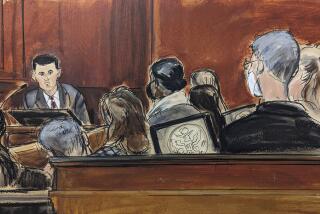Keating Jurors Told Bond Sales Failed Safety Test : Trial: An expert witness testifies that American Continental’s high-risk investments were unsuitable for individual small investors.
- Share via
LOS ANGELES — American Continental Corp. sold junk bonds through its Lincoln Savings & Loan branches without key safeguards that usually accompany securities sales, an expert witness testified Monday at the criminal fraud trial of Charles H. Keating Jr. in Superior Court here.
The company’s bonds, which were sold from late 1986 to early 1989, were high-risk investments that were not suitable for the individual small investors targeted by the company, said Alfred E. Hofflander, a professor at UCLA’s Graduate School of Management.
In addition, the bonds were sold without the assistance of brokers and investment bankers, and there was no market available to resell the bonds--three safeguards that help to protect investors, Hofflander testified.
“The average person on the street has no sophistication in evaluating the risk of an investment,” Hofflander said during the sixth day of testimony in the trial of Keating, American Continental’s former chairman.
A prospectus is designed to be a “complete disclosure” about the financial condition of a company, he said, but is difficult to read and understand.
Keating, American Continental’s former chairman, is accused in 20 counts of defrauding 22 small investors out of $1.8 million through false statements and omissions of material information in the sale of his company’s bonds.
The investors are part of thousands of bondholders who lost more than $250 million after the Irvine-based S&L; and the Phoenix company collapsed in April, 1989. Lincoln is the biggest thrift failure to date with a cost to taxpayers of $2.6 billion.
Keating, 67, denies the charges and counters that he used the best legal and accounting help available to structure the bond sale program. He has argued that investors would have been paid off had federal thrift regulators not caused the financial crisis that led to the downfall of his unconventional thrift and real estate development company.
Hofflander, though, said the company had transformed the thrift into a riskier business venture that relied on sales of high-risk securities and real estate to come up with enough income to pay its expenses.
The holders of bonds sold through Lincoln branches, he said, stood last in line to get refunds if anything went wrong with the company. Standing ahead of them were holders of two other bond issues, which were sold to institutional investors, such as pension funds and insurance companies.
The low-grade, unrated bonds bought mainly by Lincoln customers would have been rated as junk bonds likely to default had a rating been obtained, Hofflander said.
Hofflander will continue his testimony today.
More to Read
Inside the business of entertainment
The Wide Shot brings you news, analysis and insights on everything from streaming wars to production — and what it all means for the future.
You may occasionally receive promotional content from the Los Angeles Times.










